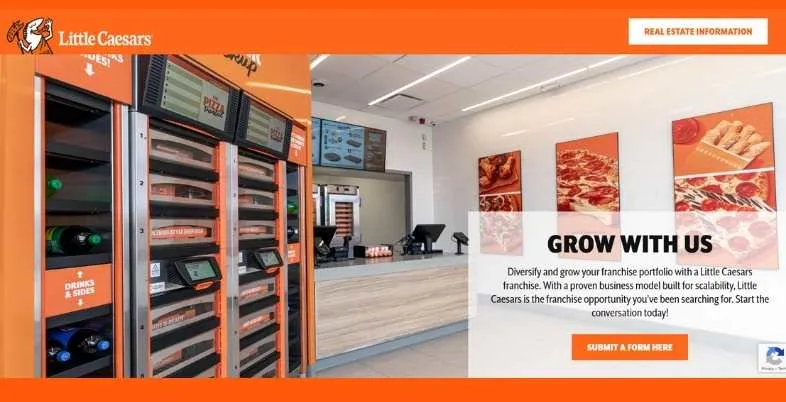The global pizza and fast-food industry is booming in 2025, with brands expanding across countries to meet the ever-growing demand for quick and affordable meals. Among these giants, Little Caesars stands out as a trusted name, famous for its Hot-N-Ready pizzas and value-for-money approach. With thousands of outlets worldwide, it has become one of the top choices for entrepreneurs looking to invest in the fast-food sector.
If you are considering stepping into the franchise world, knowing the Little Caesars franchise investment is the first step. Beyond just numbers, it’s important to understand how the brand operates, its business model, requirements, and the potential profit margins for owners.
In this blog, we will break down the complete details of the Little Caesars franchise cost, requirements, earnings potential, risks, and tips to maximise ROI—helping you decide if this global pizza franchise is the right fit for your investment journey.
What is a Little Caesars Franchise? & How Their Franchises Operate

A Little Caesars franchise is a business concept that enables independent investors to use the proven system of a global pizza giant. Franchisees can have access to a reliable brand, a proven collection of recipes, training opportunities, and even marketing assistance as opposed to opening an entirely new restaurant. This limits the risks associated with operating a stand-alone food business. Knowing the Little Caesars franchise cost, investors have the possibility to estimate the opportunity within the financial means and objectives.
Affordability, speed and convenience is a business model of the company. Its Hot-N-Ready idea guarantees an immediate availability of pizzas, and it is a favorite of any family and the working population. The strength of large-scale purchasing, centralized supply chains, and permanent brand support are also in favor of franchisees. This model has made Little Caesars to be the number three-largest franchise of pizza in the world.
Little Caesars offers different ownership models to suit investor needs:
- Single-Unit Franchise: Ideal for beginners entering the food business.
- Multi-Unit Franchise: For experienced investors seeking higher returns.
- International Franchise: For those expanding in global markets.
Each ownership type has different requirements and influences the total Little Caesars franchise cost.
Little Caesars Franchise Cost Breakdown (Detailed)
One of the first questions potential investors ask is: “How much does a Little Caesars franchise cost?” The answer depends on several factors such as location, ownership type, and operational size. On average, the Little Caesars franchise investment ranges between $378,000 and $1,695,000, which covers expenses like the franchise fee, equipment, leasehold improvements, and initial marketing.
Franchise Fee
Every franchisee must pay a one-time Little Caesars franchise fee of around $20,000–$25,000, depending on the region. This fee gives you the right to use the brand’s name, systems, and trademarks.
Initial Investment
The Little Caesars franchise investment includes:
- Store construction & design
- Kitchen equipment and furniture
- Licenses and permits
- Signage and branding
- Initial inventory
Ongoing Costs
- Royalty Fee: 6% of gross sales
- Advertising Fee: Around 4% of sales (goes toward national & local marketing)
- Operational Costs: Staff salaries, rent, and utilities
When evaluating the Little Caesars franchise cost, it’s important to also calculate long-term profitability and revenue potential. Many owners report steady cash flow thanks to the brand’s affordability-driven model, which attracts a wide customer base.
Franchise Requirements
- A Little Caesars franchise allows investors to run a pizza outlet with the brand’s proven systems, training, and support.
- The business model focuses on affordability and speed, with the Hot-N-Ready concept attracting steady customers.
- The average Little Caesars franchise investment is $378,000–$1,695,000, including setup, equipment, and inventory.
- A one-time franchise fee of about $20,000–$25,000 plus ongoing 6% royalty and 4% marketing fees apply.
- To qualify, franchisees typically need a net worth of $350,000–$400,000 and $150,000–$200,000 in liquid assets.
- Mandatory training and continuous support ensure smooth operations and higher profitability potential.
- This gives investors a quick snapshot of the Little Caesars franchise price and requirements before deciding to invest.
Profitability & Earnings Potential
Investors always ask if the Little Caesars franchise cost is worth it. On average, a franchise owner can earn anywhere between $90,000 to $150,000 per year, depending on location, operations, and customer traffic. With affordable pricing and strong brand recognition, Little Caesars generates steady cash flow and attracts repeat customers.
| Brand | Initial Investment | Royalty Fee | Avg. Annual Profit | Market Share |
| Little Caesars | $378K – $1.69M | 6% | $90K – $150K | 8%+ |
| Domino’s | $1.5M – $3M | 5.5% | $120K – $200K | 31%+ |
| Pizza Hut | $1M – $2.5M | 6% | $100K – $180K | 14%+ |
| Papa John’s | $800K – $1.2M | 5% | $70K – $120K | 6%+ |
- Lower Initial Investment: Costs are significantly less than Domino’s or Pizza Hut.
- Brand Recognition: Strong presence as the third-largest pizza chain globally.
- Operational Simplicity: Hot-N-Ready model reduces wait time and staffing needs.
- Solid Support System: Ongoing training, marketing, and supply chain help boost success.
In short, while Domino’s may dominate in market share, many investors find the Little Caesars franchise cost more affordable with comparable returns, making it an appealing entry point into the pizza business.
How to Open a Little Caesars Franchise – Step-by-Step
Franchising under Little Caesars can be a gratifying business experience should you get the process right. The following is a roadmap to start in a simplified way:
- Preliminary Research and Budgeting: Learn about the Little Caesars franchise price, in terms of requirements and commitment investment. Get ready to budget the amount of franchise fee, setup and working capital.
- Apply Franchise: Use the official Little Caesars franchise portal and fill in the information about your business objectives, background, and finances.
- Franchise Approval and Interview: In case you are shortlisted, you will be called to discuss and interview with them to see how appropriate you are.
- Sign Franchise Agreement: When you are approved, you will sign the franchise disclosure document (FDD), and conclude the partnership with Little Caesars.
- Safe Financing and Site: Find funding (self-fund or borrowing) and secure prime site with high traffic, preferably, in and around residential, schools or shopping centers.
- Store Set up and Training: Assemble and furnish your store using the design and specifications of the brand. You and your employees will be trained extensively in operations, food safety and customer service.
- Grand Opening and Marketing Support: Open your store with the support of the Little Caesars marketing team, promotional efforts and operating support to help draw customers in as fast as possible.
Tips for faster approvals and better ROI
- Well-prepared Financial Materials: Have your credit history, liquidity documentation and net worth materials on hand so that franchise approval is made faster.
- Select the Ideal Site Early: Explore the high foot traffic areas around schools, malls and residential areas to reduce payback time.
- Multi-Unit Ownership: The leveraged multi-unit ownership is usually associated with the fact that investors planning to establish several outlets have faster approvals and higher returns because of the economies of scale.
- Bargain the Lease: Reduce lease payments in the finest locations to enhance future returns.
- Adhere to Brand Standards: Adherence to the Little Caesars setup, menu and quality standards prevent delays and guarantee customer loyalty.
- Local Marketing Boost: Invest in social media ads, local partnerships, and launch offers beyond national promotions to build loyal customer base faster.
- Technology Integration: Use POS systems, delivery apps, and online ordering to increase sales channels and cut operational inefficiencies.
Advanced Insights for Investors
Investing in a Little Caesars franchise, one may think outside the box and gain in the long-run. These are some of the sophisticated moves that intelligent investors employ in order to keep up:
- Maximize Profit Margins: Continue to reduce food waste, negotiate with suppliers to receive a bulk-discount, and maximize the schedules of staff. Family meals, better cheese combinations, and other side options such as Crazy Bread can be highly upsold to increase average order value.
- Multi-Unit Strategies: Most franchisees do not just focus on 1 outlet but establish 2-5 outlets in an area. This strategy disperses fixed expenses like marketing and logistics, builds brand dominance in the local markets and drives greater cumulative profits.
- Technology Integration: The convenience that modern consumers are seeking counts, which is why it is important to integrate POS analytics, mobile ordering, and third-party delivery platforms. There is also the advantage that automation also eliminates errors and accelerates service and that directly relates to customer satisfaction.
- Smart Marketing: Little Caesars might have countrywide promotions of its brands but local store marketing will provide an advantage. Community events, sponsoring local sports team, and geo-targeted Facebook ads contribute to community customers becoming loyal to the product.
Through the combination of the two strategies, the franchise owners not only ensure a quicker ROI but also achieve a long-term sustainable growth.
Conclusion
The decision to enter the world of franchising is never the easiest one, yet with Little Caesars, the process seems to be a little bit less intimidating. The popularity of the brand, low cost of franchising and easy model of operation, makes it a formidable competitor in the worldwide pizza industry. It provides a safer entrance point to new entrepreneurs than other more expensive pizza chains, whereas experienced investors find it an intelligent addition to their portfolio due to its stability and growth prospects.
If you are planning to own a Little Caesars franchise, the first step is to carefully assess your finances and understand the full cost structure. From there, choosing the right location and preparing the required paperwork will be key to faster approvals. Once approved, focusing on staff training, efficient operations, and staying aligned with brand guidelines can make a huge difference in the long run.
The real growth, however, lies in thinking beyond just one outlet. Expanding into multiple units, using technology to streamline deliveries and digital orders, and investing in smart local marketing campaigns can all maximize returns. With the right mix of preparation, patience, and strategy, your Little Caesars franchise can grow into a highly profitable business.
Discover More Franchise Ideas:
FAQs
How much does a Little Caesars franchise cost near me?
The cost of a Little Caesars franchise usually ranges between $378,000 and $1.7 million, depending on location, store size, and local setup costs. Prime urban spots or malls may require higher investment due to real estate and operational expenses. Always check with the brand for exact estimates in your city.
How much does a Little Caesars franchise owner make per year?
Franchise owners, on average, make after expenses, between $75,000 and $150,000 per year. Location, store management and marketing strategies are key to profits. There are outlets that perform well in high traffic regions that can cross this spectrum, and newer stores can take time to stabilize.
What is the cheapest pizza franchise to own?
Little Caesars is one of the low-cost international pizza franchises since the franchise fee is less and supported. There are also some local or regional pizza brands with lower entry costs, and these tend to be less well known in their brands than Little Caesars.
Does Little Caesars make a profit?
Yes. This model is profitable to a majority of franchisees because of the constant demand of customers by the company under the brand name Hot-N-Ready. Good locations and effective management usually lead to healthy margins as registered by owners as opposed to other fast-food investments.
What is the Little Caesars failure rate as a franchise?
Little Caesars boasts of relatively lower failure risk than smaller brands due in large part to its well known brand name and established support base. But, as in any business, mismanagement or bad location will make things difficult.
Which is better domino franchise or Little Caesars?
Domino is larger on the international scale but at the expense of increased investment and royalty payments. On the other hand, Little Caesars is cheaper, simple to operate and more desirable to first-time investors who want to get their ROI within a shorter period.





